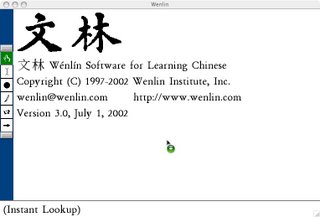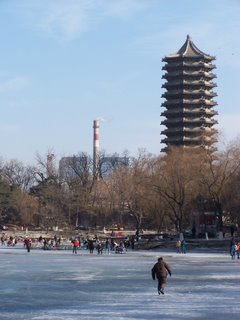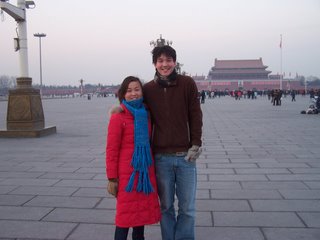
污染 - Pollution
蟑螂 – Cockroach
不三不四 – Sketchy (not three not four)
The pollution in Beijing is unbearable. Objects as near as just fifty feet away are obscured by clouds of toxins and smog. Just normal breathing has been giving me a headache and everyone’s smoking only adds to the toxins. As soon as I get off of the smoggy street, I go into a smoky room. I’ll try to find some pictures to corroborate this.
Yesterday was the last day that we could speak English, so all of the students hit the bars. Near to our school is a strip called San Li Tou (pronounced San Li Touar in a Beijing Accent), which was a trip. There were beggars everywhere and I followed some of the returning students back to a back-alley bar that was supposed to have cheap drinks. On the way there, we passed a number of bars that we packed with Chinese. Each had a small band playing for them and were filled with smoke. The bands ranged from rock acts complete with grungy, long-haired rockers in tight pants to two –piece mom-and-pop acts which only had an old woman singing and a guy with a keyboard. In each of these bars, a bunch of older-looking Chinese men were sitting at tables that were placed all over the dance floor. It was strange because it wasn’t a rock show, nor could people really talk to each other because of the music. I was trying to look into these bars in order to figure out the social dynamics, but my efforts were hindered by the small children grabbing at my arms and putting their hands in my pockets.
We arrived at the bar, which was essentially a basement with a counter. I was amazed that such a place could exist in China, but I’m learning that any expectation of China is totally unfounded. Many of the expectations are the result of orientalized bullshit that doesn’t account for the vast economic changes that have happened within the last twenty years. Speaking of orientalism, it really affects everyone’s conceptions of Chinese women. It’s very difficult for a Chinese woman to be sexy in American eyes because we’ve been so conditioned to think that they are cute, which is manifest from our conception of them as children. At best, they are beautiful, but it is an untouchable beauty, like a child. However, the instances in American culture when they are sexy is a fetishism of the exotic.
Alright I’ll stop waxing philosophical using ideas from books I haven’t read (I’ve read Said’s intro. Do I get credit for that?). After having drinks, we went to a disco called Club Blu, which was on the third level of the building across the street. On the way up the stairs, I saw fancy satin curtains through the door in the second floor. I went through the door and found a beautiful café that was full of books. I looked around this huge café/bookstore for a while and realized that is a French-oriented restaurant that serves relatively inexpensive wine and French food. The prevalence of this sort of western restaurant is not unlike the lunch I had eaten just that day, which was at the “cozy café”, a small restaurant on the second level of a Soho building structure. They served hamburgers and other western food inside of a tiny restaurant which had about four workers serving the twelve seats. These western restaurants are all over Beijing, but they are not nearly as prevalent as the Mcdonald’s and KFC, which is usually what Chinese people associate with American culture.
The world of the private college student is small. At this program, everyone is related by just a few degrees of separation. I could go into it, but it was expected before I came here. What was a surprise was the lack of acknowledgement of Macalester, but I think that is just to be expected of small schools in general. Today, we started the language pledge and I am now trapped in a cage of incoherent speech. However, everyone seems to be struggling together and we are well aware that the only way to get out of it is to speak more.
That entry was written a while ago. It takes me a while to finish these long posts, so the few days that followed that post will be completed by using a much simpler medium: pictures and captions. The post will end with an e-mail from Anthony Carr, who will be henceforth known as Ground Control.

This is one of my roommates. We live in a very nice dorm, so I wonder how many of these guys live in some of the slums that we've seen. Many of the slums are right next to huge shiny buildings, which is characteristicically Chinese.

This woman was swinging her flag around for a few hours while listening to sparse techno. Many older people gather in the parks to pursue their hobbies and it all takes on an aspect of spectacle. Often, the spectator can become part of the show, which is what happened with the huge harmonica band in the next picture. Everyone then gathered around the band and started singing along.
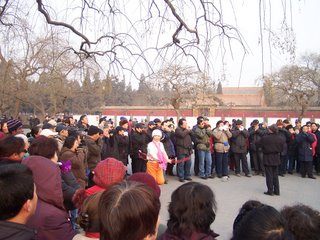
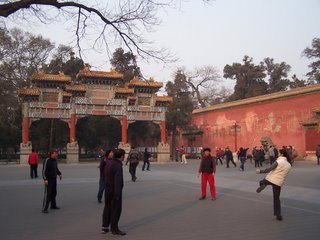
Many people use the parks as a place to exercise. As you walk through a park, many older people are walking around, sometimes vigorously. Perhaps the most entertaining, outside of the flag-waving and prevalent ballroom dancing, is the incredible athleticism exhibited by the hacky-sackers. It isn't the same as American hacky sack - they play with what is best described as a huge badmitton shuttlecock. However, the accuracy and distance they can get from it is incredible. I should take a video.
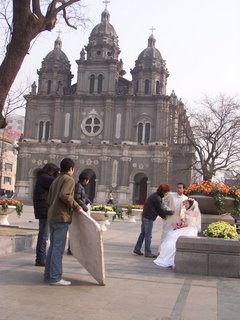
There were a number of attempts to christianize China, which resulted in the construction, destruction, and reconstruction, of a number of churches. This is one of the churches that surround the Forbidden City. The Forbidden City has a church at its North, East, South, and West - this is the East Church. It isn't large or particularly beautiful, but I liked the picture becasue people are getting their wedding pictures in front of it.

Shopping is everything in China and every need is filled - except deodorant. Clothing stores are everywhere, but don't expect to ever be able to find a Ming vase, a silk padded jacket, or fancy shoes. Everyone wears western clothes. Strangely, the one place where you
can find a padded silk jacket is Wal Mart.
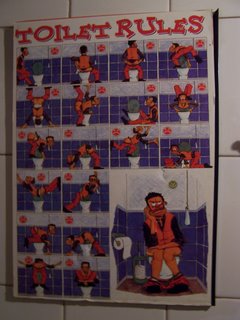
I just thought that this was funny. Perhaps it is a reward for getting so far through this imposing entry. An even better reward is Tony's eloquent e-mail that he sent to me in response to my request for information:
yo.
heres some info that really interested me.
you certainly sparked my curiosity.
attached are the following dangerous documents:
1) wikipedia article "Media of the People's Republic of China" (english)
2) book in pdf - "Media Control in China" written by He Qinglian and published by HRIC. (chinese)
i read an excerpt in english. heres a review:
Media Control in China describes how China's much-lauded economic modernization has allowed the government to camouflage its pervasive control under the glossy façade of consumerism, with a shift from ham-fisted censorship to an elaborate architecture of Party supervision, amorphous legislation, stringent licensing mechanisms, handpicked personnel and concentrated media ownership.
*) in the future, request any info on any topic you want. i will send you whatever i find, including a wikipedia summary, within the next 24 hours.
call me ground control.
i got your back.
tony
